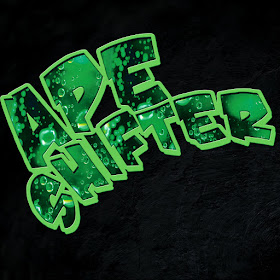Now we’re cooking with more inflammable gas this year with
Ape Shifter’s second album as they keep the fires burning from their follow up
to their sole self-titled debut released in 2017. This time, the trio go into
some of the different genres and carrying more of the Metal counterparts they
always keep in the back seat of the car by revving it up to get the engines
rolling by driving down to the heart of New Mexico and seeing the sunsets over
the horizon.
Listening to Haskett,
the trio ride in their motorcycles by going into the towns of the Thrash Metal
genre by tackling the early days of Metallica’s Kill ‘Em All and Master of
Puppets-era by travelling back between 1983 and 1986. The first minute and
24 seconds of the Mask of the Ancient
Warrior becomes this powder keg that erupts at the exact moment Jeff and
Kurty go into metallic riffs and blistering middle-eastern textures.
Jeff shreds more throughout his guitar as Florian’s bass
riff goes on a loop as Aug channels the mysticism’s of Ash Ra Tempel’s Manuel
Gottsching for a few seconds before heading back into the harder punches by
reaching the finish line. On 7 Years Fat,
7 Years Lean Ape Shifter channels the workout of Iron Maiden’s Seventh Son of a Seventh Son as you can
imagine the trio taking you inside the Egyptian tombs while Jeff’s guitar’s
opens the door.
Once you go in, there’s no turning back. But then the mood
changes as they honor more of the sounds from the Moving Pictures-era of Rush. It sounds like an extended mid-section
version of the incredible styles of Alex Lifeson as Jeff goes back into the
compositions of Red Barchetta as the
cars go into some intensive heat as the gas pumps up the speed values by
reaching the finish line.
The trio returns to the funk-rock roots on Jiggy Jiggy Boom Boom. And it’s not just
getting down and getting funky, but with the raunchy blues rock and Walter
going through the textures of Bootsy Collins and Larry Graham as Jeff gives
Florian the chance to come center stage and get into those slap-and-pop
sections to honor the two masters.
Die Rauscchmeiser sees
them delving into the waters of the British
Steel-era of Judas Priest as Aug and Walter get the energy juice pumped up
once more by channeling Priest’s Glenn Tipton and Iron Maiden’s Steve Harris. They
are honoring the NWOBHM sound on this track and they have got the pancakes and
coffee well made for an amazing morning breakfast.
The closing track, Matilda
which is sung by Jeff himself, has this Beatle-sque vibe with a twist to the
Stones Their Satanic Majesties Request-era
with a Celtic violin touch by Kilian Kayser. There is some psychedelic
vocalizations and lyrical structures that deal with innocence being killed,
moving on after losing someone, suicide, and picking either between your
friends or your fights.
Ape Shifter have come a long way. And their second album is
so far the beginning and they’ve really brought more ingredients to the table
to make some more hot and spicy wasabi pizzas and the energies of funk, metal,
psych, and a teensy-bit of rockabilly, they know their genres very well and I
hope to hear more ideas they would come to the table.
They'll be starting their touring in Germany from March 30th to April 30th and then, performing at a festival on July the 24th at the Free n Easy Festival in Munich. So please check them out.
Spotify:
Bandcamp:
Tour Dates:
30.03.2019 DE-Immenstadt,
Rainbow
14.04.2019 AT-Salzburg, Rockhouse
15.04.2019 DE-Bamberg, Live Club
16.04.2019 DE-Jena, Rosenkeller
17.04.2019 DE-Fuerstenwalde, Club Im Park
18.04.2019 DE-Hamburg, Bambie Galore
19.04.2019 DE-Berlin, Supamolly (w/ David Judson Clemmons)
20.04.2019 DE-Hannover, Strangriede Stage
22.04.2019 NL-Tilburg, Little Devil
23.04.2019 DE-Stuttgart, Kap Tormentoso
24.04.2019 DE-Frankfurt, The Cave
25.04.2019 DE-Koeln, MTC (w/ Zodiac)
26.04.2019 DE-Oldenburg, Club Cadillac
27.04.2019 DE-Karlsruhe, KOHI (w/ Far Behind The Sun)
30.04.2019 DE-Willofs, Veteran Treffen
24.07.2019 DE-Munich, Free n Easy Festival
14.04.2019 AT-Salzburg, Rockhouse
15.04.2019 DE-Bamberg, Live Club
16.04.2019 DE-Jena, Rosenkeller
17.04.2019 DE-Fuerstenwalde, Club Im Park
18.04.2019 DE-Hamburg, Bambie Galore
19.04.2019 DE-Berlin, Supamolly (w/ David Judson Clemmons)
20.04.2019 DE-Hannover, Strangriede Stage
22.04.2019 NL-Tilburg, Little Devil
23.04.2019 DE-Stuttgart, Kap Tormentoso
24.04.2019 DE-Frankfurt, The Cave
25.04.2019 DE-Koeln, MTC (w/ Zodiac)
26.04.2019 DE-Oldenburg, Club Cadillac
27.04.2019 DE-Karlsruhe, KOHI (w/ Far Behind The Sun)
30.04.2019 DE-Willofs, Veteran Treffen
24.07.2019 DE-Munich, Free n Easy Festival



